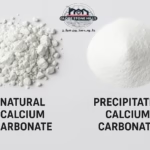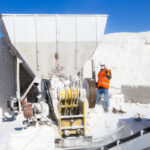Calcium Carbonate in the Construction
calcium carbonate (CaCO3) is a naturally occurring substance found in many rocks and minerals, such as limestone, marble, and chalk. This substance has physical and chemical properties that make it an essential component in many building materials, making it an indispensable element in the construction industry.
The importance of calcium carbonate in building materials
- Strength and resistance: Calcium carbonate increases the strength and hardness of various building materials, such as cement, bricks, and concrete. It acts as a binding agent between particles, enhancing the cohesion of the material and increasing its resistance to corrosion and damage.
- Hardness and Durability: Calcium carbonate has a high hardness, making it ideal for use in construction applications that require high resistance to pressure and abrasion, such as foundations, walls and floors.
- Thermal and sound insulation: Calcium carbonate acts as a heat and sound insulator, contributing to improved energy efficiency in buildings and providing a more comfortable indoor environment.
- Flexibility: Some types of calcium carbonate have a certain flexibility, which makes them suitable for use in applications that require a certain flexibility, such as some types of paints and adhesives.
- Affordable: Calcium carbonate is a naturally occurring material that is widely available, making it an economical building material.
- Cement: Calcium carbonate is used in the cement industry as a basic material, as it contributes to the formation of the crystalline structure of cement and strengthening its bonds.
- Bricks: Limestone (which consists mainly of calcium carbonate) is used in the manufacture of bricks, either as a raw material or as an additive to enhance the properties of the bricks.
- Concrete: Calcium carbonate is used in the concrete industry as a filler, as it helps reduce the cost of concrete and improve some of its properties.
- Adhesives: Calcium carbonate is used in the manufacture of various adhesives, such as white cement and gypsum, where it acts as a filler and enhances the bonding strength.
- Paints: Calcium carbonate is used in the paint industry as a whitening and filling agent, giving paints a white color and increasing their ability to cover the surface.
- Insulating materials: Calcium carbonate is used in the manufacture of heat and sound insulating materials, such as gypsum boards and rock wool.
Alongside the engineering uses of calcium carbonate in concrete and bricks, there is a growing interest in incorporating sustainable materials into modern construction. For some examples of eco-friendly building solutions, you can visit BHome Living
for insights into sustainable construction practices and green building designs
In short
calcium carbonate is an essential material in the construction industry, contributing to the improvement of various material properties, such as strength, durability and insulation, and reducing costs. Due to its abundant availability and easy accessibility, calcium carbonate will continue to play a vital role in the construction industry in the future
Recent Posts
- Globe Stone Hills: Your Comprehensive Guide to High-Quality Calcium Carbonate Solutions
- The Role of Calcium Carbonate in Soap and Detergent Manufacturing
- Precipitated vs Ground Calcium Carbonate: Key Differences, Uses & Benefits
- Calcium Carbonate Quarries in Egypt | High-Purity White Mineral for Industries
- Difference Between Coated and Uncoated Calcium Carbonate
Latest Posts
Contact the Globe Stone Hills team
Gallery
- © Copyright 2024. Globe Stone Hills




















